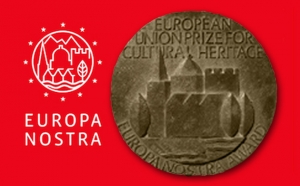BUSINESS CENTRE
XpatAthens
Thursday, 14 April 2016 07:00
Greece Wins Double EU/Europa Nostra Awards For Cultural Heritage
Greece is one of the 28 award winners of the 2016 European Union Prize for Cultural Heritage/Europa Nostra Awards. The country scored two awards in the category of “Conservation” for the Byzantine Church of St. Peter in Kastania, Mani, and the Traditional Watermill in Agios Germanos, Prespes.
The winners of the award, considered Europe’s highest honour in the heritage field, were revealed by the European Commission and Europa Nostra. Independent expert juries assessed a total of 187 applications, submitted by organisations and individuals from 36 countries across Europe, and selected the winners.
The winners of the European Heritage Awards 2016 will be celebrated during a high-profile event co-hosted by EU Commissioner Navracsics and Maestro Plácido Domingo in Madrid at the end of May.
To read this article in full, please visit: Greek Travel Pages
To read this article in full, please visit: Greek Travel Pages
Published in
Greece In The News
Tagged under
Tuesday, 13 September 2016 06:14
Navarino Challenge 2016 Was Completed And Left Wonderful Impressions
Navarino Challenge 2016 was completed leaving wonderful impressions!
Thousands of participants from Greece and abroad took part in the richest schedule of activities ever presented by an event!
Navarino Challenge 2016 completed successfully for a 4th consecutive year, confirming its title as the top sports tourism event in Greece, offering unique moments and creating great memories to each participant!
More than 2,000 amateur and professional athletes, friends of sports of all ages (according to the updated results - the oldest athlete was 82 years old), embraced the event by participating in more than 15 activities in Messinia and Costa Navarino from 9 to 11 September 2016.
Navarino Challenge attracted the global interest with participants coming from countries as USA, Canada, Australia, Britain, Sweden, Denmark, France, Germany, Switzerland, Italy, South Africa, Ghana, Turkey, Bulgaria, Romania and Cyprus. Meanwhile, bookings at The Westin Resort Costa Navarino, ran extremely high during the weekend, on the occasion of the event, supporting thus the hotel & hospitality tourism and promoting Messinia as a destination worldwide.
For the third consecutive year, Navarino Challenge had the safety and dynamic support of Allianz Greece. The company which is sensitive to issues related to health care and supports reinforcing the message of health protection and the adoption of a healthier lifestyle through exercise and balanced nutrition, supported the event (with its numerous team). The company’s principles and values are inextricably linked with those of the organization.
On Friday, September 9, 2016, the schedule of Navarino Challenge included activities for those staying at The Westin Resort Costa Navarino, such as: aqua aerobic lessons for all and baby swimming (for children up to 3 years old) with the support of Swim Academy, of the Federal Swimming Coach, Nikos Gemelos and the Silver medalist and World Champion in open water swimming, Spyros Gianniotis, TaeKwonDo lessons from the twice silver Olympic medalist Alexandros Nikolaidis (with the dynamic participation of the teams from Kyparissia, Kalamata and the whole region of Messinia) pilates lessons by the physical education instructor, specialized in pilates, Mandy Persaki, kick boxing lessons by the kick boxing champion Alexandros Nikolaidis, climbing lessons (by the certified climbing instructor of Navarino Outdoors, George Malamas) and a beautiful bike ride at Voidokilia -with the support of both activities from Navarino Outdoors. At the same time there was also a 4on4 basketball tournament (with the support of basketblog.gr) and the participation of Olympic medalists, champions, media groups and VIP guests of the event, golf clinics with the support of Navarino Golf Academy and scuba diving with the support of the Aqua Divers Club and Scuba Hellas. During the weekend, participating athletes quenched their thirst with the Natural Mineral Water "Vikos" that contributes to the well-functioning of the body during sports.
On Saturday, September 10, 2016 morning, the weather being an ally (on a sunny day), the whole activity of the event was transferred in the Municipality of Pylos-Nestor, for the swim sports.
In the beautiful bay of Navarino at the picturesque port of Pylos, hundreds of friends of the sea had the opportunity to swim without competition, in the calm waters, covering the dreamy one mile (1.6 km) swimming route designed by Nikos Gemelos.
Meanwhile, the activity of Kids' Athletics was presented for the first time in Pylos Square by the ambassador of the event, the Olympic and World Champion in 400m. hurdles Periklis Iakovakis. The activity aimed at getting children acquainted with the track and field sports, as it has been developed and established by a special panel of scientists from IAAF (International Association of Athletics Federation) and is officially implemented in Greece by the Hellenic Athletics Federation (SEGAS) in cooperation with the Ministry of Education. Kids' Athletics included, among others, the activity of standing long jump, the sport of the world famous Olympic champion and legendary Kostis Tsiklitiras, who was born in Pylos Messinia.
For the third consecutive year, athletes and organizers moved with the safety and efficient engines of the cars of Ford Motor Hellas, the official supporter of Navarino Challenge.
Right after, within the same day, a Stand Up Paddling race by BIC® Sport took place for the first time in the event!
With the support of one of the most recognized brands in the world, BIC® company, present in the field of water sports with BIC® Sport since 1979, participants were divided into groups of beginners and professionals, covering the half mile and one mile routes respectively at the port of Pylos. All athletes had the opportunity to test the credibility of the SUP BIC® boards. Stand Up Paddling was held with the support of Surf Salad!
Mediterranean diet was highlighted by the food blogger Gogo Papadionysiou also known as Mamatsita who made traditional lalagia & diples with the assistance of local women and the team of Poseidonia restaurant in Pylos. The Mayor of Pylos-Nestor, Mr. Dimitrios Kafantaris awarded Spyros Gianniotis, Kelly Araouzou and Nikos Gemelos and offered them a tour at the home of Tsiklitiras in Pylos.
The “sea-day” was concluded with a demonstration race with 25 Optimist and 3 big open boats from Maritime Athletic Pylos Association “Nestor”, the Sailing Club of Kalamata “Poseidon” and the Sailing Club of Kalamata “Eolos” with the assistance of the Municipality Pylos-Nestor, the Port Authority of Pylos, Pylos Association of Enterprises for Tourism Development and Explore Messinia.
In the midday of Saturday, the action returned at The Westin Resort Costa Navarino! There, for the second consecutive year the boccia activity was presented, with the dynamic presence and support of the team of Allianz Greece (more than 90 people attended the demonstration of the sport). The ambassador and Gold Paralympic athlete of boccia, Grigoris Polychronidis greeted the event with its own private message, (as he was in Rio for the Paralympic Games), giving the pass for the demonstration of the sports to the athletes of the Greek boccia national team Christos Galaios (6th position in the European Championship) and Christos Kypriotis (Greek Champion) and the coach Jenny Rodiou and Evangelia Galaiou.
Saturday night ended in the most glittering and spectacular way, with the colors of the official airline partner of the event, Qatar Airways!
The cocktail “A Night to Remember by Qatar Airways”, was presented by the journalists Dimos Bouloukos and Dora Tsampazi. The evening moved into Swing, Jazz, Funk, Soul, Latin and Blues rhythms by Brandy Souare and included greetings, awards and many surprises for the honorees and high guests of the event.
The first award of the evening was given to the silver Olympic medalist and World Champion in open water swimming Spyros Gianniotis by TEMES S.A., Marketing & Business Development Director Mrs. Marina Papatsoni. The first surprise was announced, with the award of a set of business class airline tickets given to the silver Olympic medalist from the Commercial Director of Qatar Airways in Greece, Mr. Alexandros Michalopoulos. The World Champion in open water swimming, Kelly Araouzou was then awarded by Vikos SA Sales & Marketing Director, Mr. Konstantinos Sepetas. The event continued with the award given to the Federal Swimming Coach, Nikos Gemelos by the Chief Executive Officer of Allianz Greece, Mrs. Philippa Michali and the award which was given to the team of Allianz World Run (with the presence of Gerosideri Charis and Kafantari Dora who participated in the global initiative) by the Chief Executive Officer of Active Media, Mr. Akis Tsolis. Two more surprises were hidden next, to celebrate the four years of the event. National Geographic Channel team was awarded by the Co-Founder of Navarino Challenge & Director of Development of The Hellenic Initiative, Mr. Peter Poulos for its four years of support to the event as TV Communication Partner. The Commercial Director of FOX Networks Group, Mrs. Nadia Demiri received the relevant award, while Vargiamidis family was awarded by the ultramarathon Dean Karnazes for the four years of continuous participation in Navarino Challenge.
Immediately after that, the activity “Like for a good cause” was presented -that ran recently for the five best photos of the event chosen by the people through social media- and its charitable cause was revealed for the first time. The photographs selected were converted into canvasses and now these works will be auctioned through Charity Idols, where all revenue generated will be given to the humanitarian non-profit Foundation of the Professor Afksendiyos Kalagkos, Coeurs pour Tous Hellas - Hearts for All, which supports children with congenital heart disease. The event was welcomed by the President of the institution Coeurs pour Tous Hellas, Mrs. Anna Grimani and the Executive Committee Member at the Department of Communication, Ms. Ioanna Moundrea.
Further, another set of economy class airline tickets was drawn by Qatar Airways to a lucky couple, while throughout the duration of the “Navarino Challenge” the top airline ran another contest to the participants of the event.
The evening ended with the award given to the ultra-marathon Dean Karnazes by the Marketing Director of Ford Motor Hellas, Mrs. Petri Logara.
Navarino Challenge promotes the value of “a healthy mind in a healthy body” and the spirit of “fair play” adopting the purpose of the Olympic Movement, supported by Olympic athletes and Champions who educate youth through sport, without any discrimination. At the same time, the athletes inform them about the benefits of exercise and the Mediterranean diet and prompt the audience to support the cause of the fight against childhood obesity. Overall more than 800 children were actively involved in all activities of the Navarino Challenge weekend of!
Navarino Challenge was also supported by the Navarino Icons products, Michael & Trianthe Dakolias, Village Cinemas, the Inbi restaurant, the New Hotel and Surf Salad.
The interest of the people, that surpassed all expectations with their participation, peaked on the third and last day of the event, on Sunday, September 11th 2016. Runners of all ages, starting from Navarino Dunes in Costa Navarino ran to Pylos beach, crossing Voidokilia beach for the first time and following the trail mapped out, back in Homer’s years, by Telemachus, Ulusses’ ’ son, trying to find his missing father. The start was given early in the morning for the top Half Marathon (21,1km) -with the participation of Greek-American ultramarathon Dean Karnazes- and the 10 km route, while the 5km run followed (for running and dynamic walking). The running activity ended amid countless smiles from children who participated in the 1km, with the support of the natural mineral water “Vikos”. Routes were designed and edited by the former marathon runner, holder of national best performance on the classical route, running coach and director of All About Running, Nikos Polias. The teams of Messiniakos and Akritas had a strong presence on the running and then also in the activity of Kids’ Athletics with the ambassador Periklis Iakovakis.
Food blogger Mamatsita, with her second in a row cooking challenge, undertook to revitalize and support the participants in running by offering them traditional Messinian food in Costa Navarino with the support of Posidonia Restaurant.
Navarino Challenge presented a great innovation with the Navarino Challenge chatbot!
The MPASS company participated for the first time in the event and contributed to its success by creating the Navarino Challenge chatbot. This is a global innovation since this is the first sports tourism chatbot that gave participants the opportunity to have, instantly, automatic personal updates on offers and events, by sending just one message in the official Facebook page of Navarino Challenge. The most important was that someone was able, for the first time, to receive automatically his finish time, in any route he participated with a personal message on Facebook messenger, by simply typing his BIB number.
Navarino Challenge was held under the Auspices of the Greek National Tourism Organization and the Department of Nutrition and-Dietetics of Harokopio University of Athens with the support of Costa Navarino and The Westin Resort Costa Navarino, as well as the Municipalities of Pylos-Nestor and Trifilia. The event was included, for one more year, in the European Week of Sport with the #BeActive activity which is supported by the European Commission and the Greek General Secretariat of Sports.
The event was also assisted by the Health Runners Club of Messinia, ThaMa Restaurant, Alpha (Athlima SA), the Department of Sports Organization & Management from University of Peloponnese, Anazoe Spa Costa Navarino, 1morekm, Hellenic Athletics Federation (SEGAS), IAAF Kids Athletics, Diana “exoplizein” and Nargile while Vita N Travel was the official travel agent. The event was finally supported by the Hellenic Red Cross Sector of Samaritans, Rescuers and Lifeguards.
Official Sponsors: Allianz Greece, “Vikos” Natural Mineral Water
Official Airline Partner: Qatar Airways
Official Supporters: Ford Motor Hellas, BIC®, BIC® Sport, Navarino Icons, Michael & Trianthe Dakolias, Village Cinemas, Poseidonia Restaurant, Inbi, New Hotel, Surf Salad
Assisted by: Health Runners Club of Messinia, Pylos Association of Enterprises for Tourism Development, Maritime Athletic Pylos Association “Nestor”, Explore Messinia, Navarino Outdoors, Swim Academy, Aqua Divers Club, Scuba Hellas, Navarino Golf Academy, ThaMa Restaurant, Alpha (Athlima SA), Department of Sports Organization & Management from University of Peloponnese, Anazoe Spa Costa Navarino, 1morekm, Hellenic Athletics Federation (SEGAS), IAAF Kids Athletics, Apia, Diana “exoplizein”, Nargile
Official Travel Agent: Vita N Travel
Official Broadcaster: OTE TV
TV Communication Partner: National Geographic Channel
Under the Auspices of the Greek National Tourism Organization
Photo Credit: Elias Lefas
Official Airline Partner: Qatar Airways
Official Supporters: Ford Motor Hellas, BIC®, BIC® Sport, Navarino Icons, Michael & Trianthe Dakolias, Village Cinemas, Poseidonia Restaurant, Inbi, New Hotel, Surf Salad
Assisted by: Health Runners Club of Messinia, Pylos Association of Enterprises for Tourism Development, Maritime Athletic Pylos Association “Nestor”, Explore Messinia, Navarino Outdoors, Swim Academy, Aqua Divers Club, Scuba Hellas, Navarino Golf Academy, ThaMa Restaurant, Alpha (Athlima SA), Department of Sports Organization & Management from University of Peloponnese, Anazoe Spa Costa Navarino, 1morekm, Hellenic Athletics Federation (SEGAS), IAAF Kids Athletics, Apia, Diana “exoplizein”, Nargile
Official Travel Agent: Vita N Travel
Official Broadcaster: OTE TV
TV Communication Partner: National Geographic Channel
Under the Auspices of the Greek National Tourism Organization
Photo Credit: Elias Lefas
Published in
Local News
Tagged under
Friday, 03 August 2018 14:05
Harp Melodies At The Acropolis Museum Restaurant
Every Monday to Thursday, from 1 p.m. to 4 p.m., visitors can enjoy their coffee or lunch at the Museum restaurant listening to live harp music by Thodoris Matoulas.
Thodoris Matoulas is a member of the Contemporary Music Orchestra of ERT since 1995. He has collaborated with all Greek orchestras and has worked with Greek and foreign artists. He also teaches at the Athenaeum Conservatory.
Published in
Music
Tagged under
Wednesday, 05 December 2018 16:46
Dec 5 - 'Tis The Holiday Season
Food is a vital part of Greek culture... and it's delicious! So if you ever wondered how to adjust your diet accordingly, let us show you 3 simple steps to do so. Also, if you love coffee like most Greeks, but are not a fan of smoking... no need to worry! Check out our list of cosy and smoke-free cafes in Athens.
Please click HERE to view this issue of our newsletter!
Published in
Newsletters
Tagged under
Tuesday, 09 April 2019 07:00
Greek Islands Make Ground-Breaking Efforts Towards Plastic-Free Seas
The EU Votes Against Single-Use Plastic Products
The use of 10 single use plastic items such as straws, cotton buds, plates, cutlery, and plastic coffee stirrers will be banned in the European Union in 2021.
Along with abandoned fishing gear, single use plastic items constitute 70% of all marine litter items. Plastic takes a very long time to decompose which explains why eight million tons of plastic waste end up in the sea each year. In fact, plastic residue, including micro plastics, have been detected in fish and other marine species, consequently entering the human food chain.
Greek Islands Make Efforts Towards Plastic-Free Seas
Following the example of the small island of Sikinos – the first Greek island to ban plastic straws in 2018 – the island of Donousa has also joined the SeaChange Greek Islands initiative. The SeaChange Greek Islands is an environmental program made possible with the help of the A.C.Laskaridis Charitable Foundation and aims to tackle marine pollution in Greece.
Under the auspices of the Municipality of Naxos and the Small Cyclades, Donousa will become the first island in the Aegean to completely ban single use plastic products like cups, straws, bags and take-away packaging.
The initiative made its debut in Donousa on Friday April 5, with the briefing of the citizens and other informative events. All residents received a starter kit containing a SeaChange Donousa reusable cup while local businesses also received biodegradable bags and straws.
Published in
Local News
Tagged under
Tuesday, 23 July 2019 07:00
Deadline For Submitting Tax Returns Extended To July 29
Greek tax authorities have extended the deadline for submitting returns for the 2018 fiscal year to July 29. The extended deadline concerns individual taxpayers, legal entities, all types of businesses, non-profit organizations, etc.
Until now, 2.2 million tax returns have already been submitted online. Out of a total of 2.93 million statements, more than 334,000 indicate a tax rebate, nearly 1.8 million indicate a zero balance, and 790,000 show a debt to the state.
Article source: Naftemporiki.gr
Published in
Local News
Tagged under
Tuesday, 21 January 2020 15:00
National Gallery of Art On Track For Inauguration In March 2021
The Ministry of Culture has confirmed that the National Gallery of Art will reopen in March 2021, following the renovations and expansion works that have been underway for the last few years. More specifically, the National Gallery of Art will be inaugurated on March 25, 2021, signaling the launch of a series of commemorative events to honor the bicentennial of the Greek War of Independence.
The ministry issued a statement declaring that the amphitheater and the entrance hall are complete, while "the next phase involves the floors, the seating, and the necessary equipment."
The renovation of The National Gallery of Art has been made possible through funding from the Ministry of Culture, EU co-funding for the Attica Region, the Stavros Niarchos Foundation, and private donors.
To read this article in full, please visit: AMNA
Published in
Local News
Tagged under
Friday, 12 November 2021 07:00
Digitally Preserving & Restoring Ancient Olympia Via New App
Stunning digital reconstruction of the site of the ancient Olympic Games by Microsoft’s Augmented Reality app “Ancient Olympia: Common Grounds.” the project allows visitors to travel back in time, to the site of the Ancient Olympic Games and find Common Ground in values inspired by Ancient Olympia.
The digital revival project allows viewers around the world to explore the site of the Ancient Olympia as it was more than 2,000 years ago. It is an exciting experience through an interactive mobile app, the PC, and the exhibition of Microsoft HoloLens 2 housed in the Olympic Museum of Athens.
The project restores digitally and in 3D a total of 27 monuments in the area, among them, a Gymnasium where athletes trained and a Stadium that was home to the Olympic Games in honor of Zeus, the Temples of Zeus and Hera, the workshop of Pheidias.
To download the Microsoft Augmented Reality app “Ancient Olympics" please visit the Microsoft website or olympiacommongorunds.gr
Digitally recording and accurately representing all the details of everyday life in Ancient Olympia was no small task. In the 3D experience, buildings are recreated in lifelike detail, painstakingly researched by the Hellenic Ministry’s expert archaeologists to be as true as possible to their original forms. This includes historical timelines of the site’s changes over time and depictions of artifacts from each period, the Microsoft notes.
Through its AI for Cultural Heritage initiative, Microsoft partnered with technology company Iconem, which specializes in digitizing historic sites in 3D, to create the foundational model of Ancient Olympia. Using both on-the-ground cameras and drones to take hundreds of thousands of images of the site, Microsoft AI then processed the pictures to create models so precise, they render as photo-realistic, the company said.
To read this article in full, please visit: keeptalkinggreece.com
Published in
Local News
Tagged under
Wednesday, 13 April 2022 07:00
Top Destinations For An Authentic Greek Easter
For Greeks, Easter is the most important religious holiday of the year, celebrated in different ways throughout the country.
If you’re looking for a great excuse to escape the city for a while and enjoy the traditions and local customs that accompany this solemn occasion, the below destinations make for an unforgettable Greek Easter!
Corfu

@giwrgoskatehis
Easter in Corfu is a one-of-a-kind experience that attracts hundreds of visitors every year. Corfu is home to an array of traditions and customs, some of which have Venetian influences. The most famous tradition is the throwing of the large jugs, known as botides. The botides are filled with water and thrown one by one from the balconies of Liston, a historic neighborhood in the island’s center.
Patmos

@lifeispatmos
If you’re looking for a great excuse to escape the city for a while and enjoy the traditions and local customs that accompany this solemn occasion, the below destinations make for an unforgettable Greek Easter!
Corfu

@giwrgoskatehis
Easter in Corfu is a one-of-a-kind experience that attracts hundreds of visitors every year. Corfu is home to an array of traditions and customs, some of which have Venetian influences. The most famous tradition is the throwing of the large jugs, known as botides. The botides are filled with water and thrown one by one from the balconies of Liston, a historic neighborhood in the island’s center.
Patmos

@lifeispatmos
Patmos, the island where John the Evangelist received the visions found in the Book of Revelation, is considered a sacred place and offers a truly unique Easter experience. Among the numerous century-old rituals and customs, the most famous traditions include the Washing of the Feet ceremony in Chora and the reading of the Gospel in seven languages in the Monastery of Saint John the Evangelist.
Chios

@trazeetravel
Except for the delicious mastic, Chios island is also famous for its lively Easter celebrations. Every year, in the village of Vrontados, a variation of the Greek custom of throwing fireworks after the Anastasi takes place, known as rouketopolemos or rocket war. Two rival church congregations engage in a rocket war, firing thousands of homemade rockets across town in an attempt to hit the bell tower of the other church.
Leonidio

@aris.messinis
Leonidio is a historic town in Arcadia, in Eastern Peloponnese, and is an excellent destination to spend the Easter holidays away from the crowds. The most famous Easter tradition, dating back to the 19th century, is the colorful, homemade hot air balloons released by the villagers on the night of the Resurrection. An impressive spectacle to watch as the sky is filled with hundreds of twinkling lights resembling the stars.
Main image: 📸 @photobyosmansilahyurekli
Published in
Travel Greece
Tagged under
Monday, 03 February 2025 13:13
February At The Maria Callas Museum
The Maria Callas Museum, under the Athens Municipality, is welcoming visitors of all ages with activities and events for everyone. The bold drag baritone Nina Nay will perform two groundbreaking shows, while a children’s dance-theater performance will explore the theme of diversity. Sundays at the Museum continue with family-friendly programs for infants, children, and parents, and every Thursday, those over 65 can enjoy free guided tours through the museum!
Events & Activities
A Piece of Me...: Nina Nai at the Maria Callas Museum
Wednesday, February 12th
Wednesday, February 12th
The internationally acclaimed drag baritone Nina Nay presents her groundbreaking performance “A Piece of Me… 8 Songs from the Last Pages of Richard Strauss”, specifically designed for the Museum. This personal exploration delves into toxic relationships and the quest for authentic individual expression. The performance blends the art of Lied (set German poetry and more) with drag to create a dialogue on the lasting impact of toxic relationships and the empowerment that comes from reclaiming one's identity.
Inspired by letters from Maria Callas’ parents to her, the performance touches on their attempts to claim a part of her, each in their own way. But it’s not just about Callas... It's for anyone who might identify with or see parts of themselves in this story.
With the renowned conductor Giorgos Ziavras on piano and the revolutionary fashion designer Daglara for costumes.
Details:
- Date: Wednesday, February 12th
- Showtimes: 19:30 & 21:00
- Duration: 45 minutes
- Price: €25 (includes Museum entry before the show, optional)
- Required reservation via more.com. Book your tickets HERE!
- Note: Part of the performance will be standing.
Parallel Yellow Lines
Sunday, February 16th
Sunday, February 16th
A dance-theater performance for children aged 4-12 about diversity. Presented by the A(r)CT Performing Arts Group at the Maria Callas Museum.
What defines "normal"? How does comparison affect us? How can we discover our own abilities or "superpowers"? What do these parallel yellow lines lead to?
"Parallel Yellow Lines" is an interactive physical theater and dance performance that allows us to understand how a child with autism experiences daily life, focusing on details that may cause confusion or excitement. It invites us to reflect on each person’s uniqueness.
Details:
- Date: Sunday, February 16th
- Time: 12:00
- Duration: 65 minutes
- Ages: 4-12 years
- Price: €10 per child & €10 for a companion
- Required reservation via more.com. Reserve your spot HERE!
Guided Tour for Adults
Saturday, February 22nd
Saturday, February 22nd
Explore the fascinating world of opera and the legendary Maria Callas with a guided tour through the museum. Discover her art, legacy, and personal life through audiovisual tools, historical documents, and new technologies in this immersive experience.
Details:
- Date: Saturday, February 22nd
- Time: 12:30
- Duration: 50 minutes
- Price: €14 (Discounts available)
- Required reservation via more.com. Book your spot HERE!
Free Guided Tours for Seniors (65+)
Every Thursday in February
Every Thursday in February
Every Thursday, the Maria Callas Museum offers free guided tours for visitors aged 65 and over, included in the ticket price! Discover the museum’s treasures dedicated to the diva’s life and career, and immerse yourself in the world of opera.
Details:
- Dates: Thursdays (6, 13, 20, 27 February)
- Time: 12:30
- Duration: 50 minutes
- Price: €7 for 65+ (Tour is free)
- Call to reserve: 210 44 04 204
Family Programs
MCM KIDS: New Creators at the Maria Callas Museum – Nature
Sunday, February 9th
Sunday, February 9th
Inspired by the aria Casta Diva from Norma, children and parents will explore the natural world through music. This program encourages creative expression and connection to nature, as families compose their own music inspired by natural sounds like wind, bird songs, or rain. The compositions will be recorded and given to the participants as a keepsake.
Details:
- Date: Sunday, February 9th
- Time: 11:30-12:30 & 13:15-14:15
- Ages: 4-8 years
- Price: €13 per child and companion
- Required reservation: 210 44 04 204 (Tuesday-Saturday 10:00-18:00)
Games with Opera & Light: Twirl Through Rays of Light
Sunday, February 23rd
Sunday, February 23rd
Discover the magic of opera and light! Children will engage in creative games with light, exploring how light transforms images, expresses emotions, and alters the meaning of an artwork. How does light relate to the space we’re in? To ourselves?
Details:
- Date: Sunday, February 23rd
- Time: 11:30-12:30
- Ages: 4-10 years
- Price: €10 per child and companion
- Required reservation: 210 44 04 204 (Tuesday-Saturday 10:00-18:00)
MCM BABIES: Baby Walks
Sunday, February 23rd
Sunday, February 23rd
How do infants react inside a museum? How do they perceive exhibits and communicate with them? Designed for parents with infants, this unique experience combines art, sensory exploration, and interaction, offering a special chance for parents and babies to connect with the museum’s world of colors, sounds, and shapes.
Details:
- Date: Sunday, February 23rd
- Time: 9:30 AM
- Ages: 8 months to 2.5 years
- Price: €10 per child and companion
- Required reservation: 210 44 04 204 (Tuesday-Saturday 10:00-18:00)
Note: Space for strollers is available. For safety and space, infants should be held or in carriers throughout the program.
Published in
Local News
Tagged under











